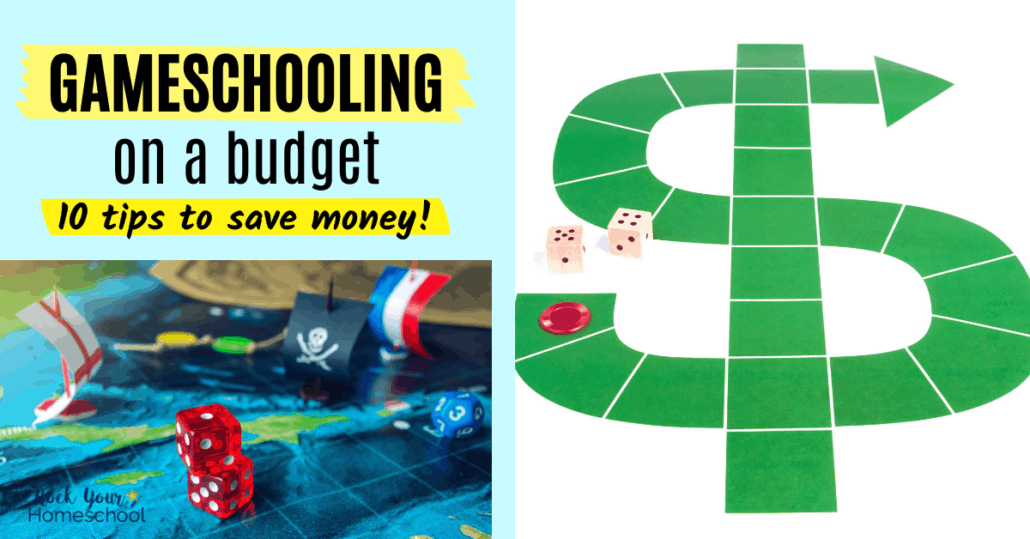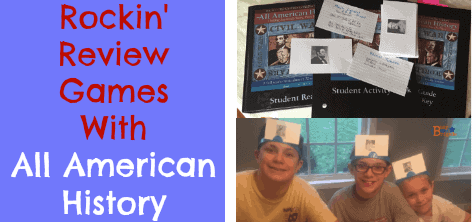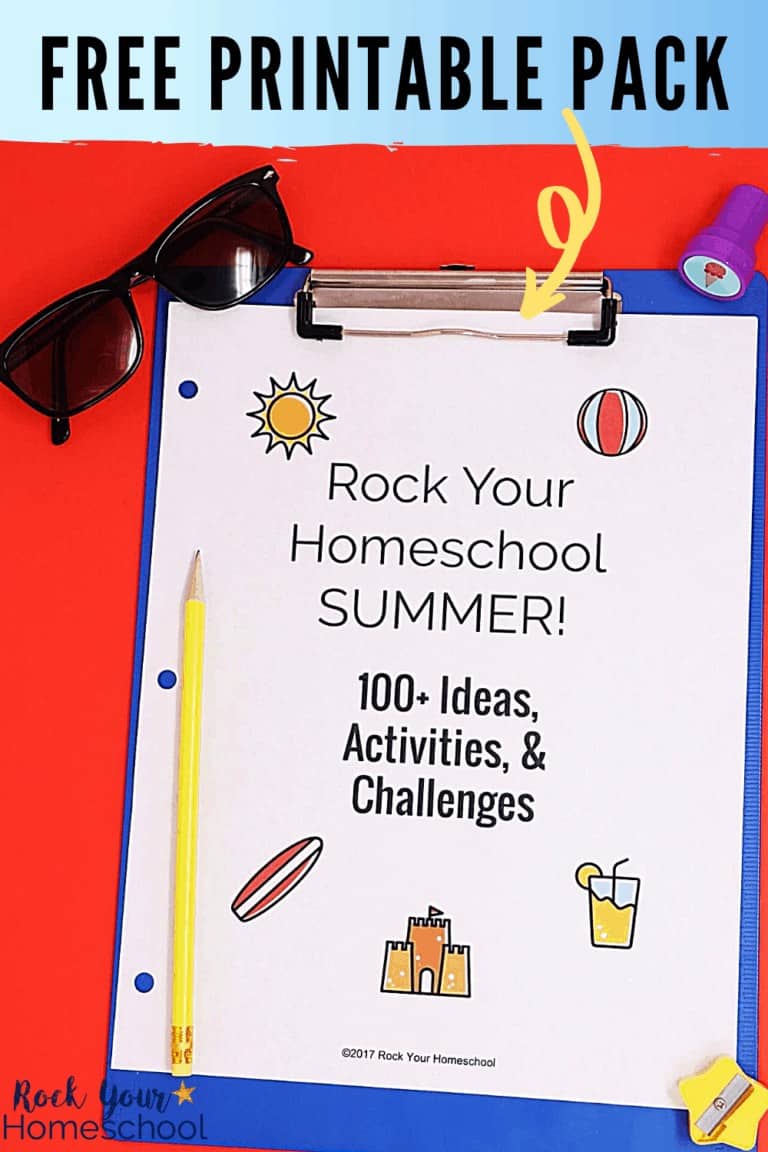These gameschooling on a budget tips and ideas will help you make learning fun without going broke!
Want to try gameschooling but money is tight?
No worries! Check out these smart ways to enjoy board games and more in your homeschool without breaking the bank.

You CAN Enjoy Gameschooling Without Spending a Lot of Money!
Gameschooling is one of the best ways to enhance your homeschool day. Discover how to get started in this FREE Gameschooling 101 Guide!
Games help kids to practice valuable skills and have fun with their family and friends.
But, let’s be honest – board games can be expensive!
That’s why you’ll love these tips and ideas for gameschooling on a budget 😊
When I thought about adding a gameschool approach to our homeschool, I went through a bit of sticker shock. Sure, some games only cost $10. But, some of the games on my wishlist cost upwards of $50 🤯
That’s a lot of money for one game!
So, I turned to my friends who also gameschool and asked how they made this work on a budget. They offered some amazing advice and encouragement.
Now, our game collection is more extensive than I ever imagined. AND I did it on a budget.
If your wallet is feeling the same strain as mine, here are some smart ways to enjoy gameschooling on a budget:

10 Tips for Gameschooling on a Budget
1. Research and Pick Versatile Games
One of the biggest mistakes I see homeschooling families making is buying expensive games that only work for one or two lessons.
You’re wasting money!
Sure, that game might be cool. And if you have the budget, go for it.
But if it’s not versatile (meaning you can use it for more than a few lessons or subjects), you may want to hold off on that purchase.
I made this same mistake and won’t do that again. Years ago, I bought a game to go along with our study of constellations. The game itself was fun, but it only taught my kids about constellations. It didn’t have any other purpose, so it sat on our shelves for months after the lesson.
I could have spent that money on other games.
Maybe you’re wondering – how do I know if a game is versatile? Here are a few things to look for:
- Does the game cover a BROAD topic that I can use for different lessons or subjects? For example, board games about the continent of Europe rather than one particular country are more appealing to me.
- Can my kids use a variety of skills while playing the game? For example, this approach works great for math games. If your kids can use it to add, subtract, multiply, or divide, that works. Remember: You can always change the rules to make it work for what you are learning!
- Will it inadvertently help with other skills? Use this tip with caution because it’s easy to find ways to justify games that you want to keep or buy. However, if the game works on problem-solving or logic in a unique way, it might be worth keeping (but not all of them!).

2. Buy Games That Will Last for Several Kids
If you’re homeschooling multiple ages and stages, this approach can be extremely helpful.
You can also modify the rules of games to make them appropriate for younger or older kids.
When you divide the game’s price by five kids (or the number of kids that you have!) instead of one AND think about how many times you’ll use it, it feels much more budget-friendly.
3. Start Small & Practice Patience
I know this tip is tough but, believe me, it’s so important!
If you’re like me, you want to buy it all as soon as the idea strikes. Unfortunately, that’s a quick way to break the budget, no matter the situation.
You don’t have to run out and buy ALL the games on the market. Start small.
I suggest picking one or two games per subject – if that’s in your budget. If that’s not doable, focus on games for math and reading. Those subjects are two of the easiest places to find games that will fit your kids’ ages and grade levels.
You also don’t have to buy all the games at the start of the school year. Consider what your kids will learn for the next six to ten weeks. Buy games to support those lessons rather than considering the entire school year.

4. Watch for Sales When You’re Gameschooling on a Budget
You don’t have to obsessively check for sales on Amazon or other online retailer. But, you can find some amazing deals when you do!
Amazon has all kinds of sales on games, even when it’s not the holiday season. About once a week, I check the Today’s Deals section to see what’s available and on sale.
When scouring sales, look for games that are 40% off or more. Believe it or not, that’s totally possible!
Also, you may notice that certain brands will have sales for all of their games at one time. Checking randomly is a good idea. Oh, and consider joining some Facebook groups help to you to find the sales. Parents often post when they find a good deal to help other families.
5. Check Out the Clearance Sections of Stores
If you have a bit of extra time when you’re shopping, check the clearance section with games. You may find a gem!
A few of the stores that I routinely check for clearance games are:
- Walmart
- Target
- Kohls
- Dollar General
- TJ Maxx
- Marshalls
- Ollie’s Bargain Outlet (games here are often already on clearance but you can find some fantastic options!)
- Big Lots
Oh, and if you love to use puzzles in your homeschool, make sure to check that section, too!
You may get lucky and find games up to 70% off in the clearance section. Score!
6. Buy Second-Hand Games
Buying second-hand games is an excellent tip for gameschooling on a budget.
Many thrift stores, like Goodwill, sell games for a few dollars. Facebook has several groups for selling used board games, too.
Sometimes stores, like Once Upon a Child, have second-hand games to buy for kids. Keep your eyes peeled whenever you’re out and about shopping. As kids grow up, people get rid of games all the time – and that’s one way you can save money on board games.

7. Ask Friends & Family When You’re Gameschooling on a Budget
Some friends and family may buy board games with the good intentions of using them, but then they never do.
Instead of letting those games sit around and collect dust, ask them if you can buy the games.
Or ask if you can use the games for a period of time for your homeschool (especially if it’s one that you don’t need for too long).
This approach is win-win. Your loved ones get to declutter (or make space for new games) and you get a boost to your gameschooling fun.
8. Buy Games for Presents
Many kids love board games. So, why not buy them games for presents?
All of my boys get at least one game for Christmas and for birthday presents. The boys love when they get new games and can share the experiences with our family and homeschool.
Don’t be afraid to tell your family that your kids want board games! Make a wishlist with each of your kids (and for your homeschool) of games you’d like to add. Whenever someone asks for a gift idea, you’ll be ready.
9. Start a Gameschooling Group to Rotate Games
If you have local friends who like to use games while homeschooling or to boost learning at home, a gameschooling group perfect opportunity to build a library of games for members to use.
You’ll need a storage location. This spot can be someone’s home or shed – a place with enough space to store games and keep it organized.
Everyone who is a member is welcome to come and take games as they want and need. A system for keeping a master list of games, as well as status of games (like if a piece goes missing or gets broken), can help your group track it all.
Each member would need to contribute. The more members you have, the better the collection becomes.
10. Go to Yard Sales
Yard sales can be gold mines for board games. You can find some gems for only a few dollars.
Tip: Double-check that all of the pieces are there when you go to a yard sale for games. If pieces are missing but you can still use the game, ask for a discount (and save even more money!).
Enjoy Gameschooling on a Budget
Gameschooling doesn’t have to break your wallet. With these tips and ideas for gameschooling on a budget, you’ll soon have plenty of games to enjoy during your homeschool time with your kids.
Do you have any questions about these ideas for gameschooling on a budget? Or any tips to add? Please let me know in the comments area below 🙂













Also contact your local public library to see what games they may have available for check out or what connections they may have for physical as well as digital content specific games ~
Ms. Karen (AKA – Ms. Liberry Lady)
Oh my stars! Such a great suggestion-thank you! I forgot about that option since our library was shut down for a time.